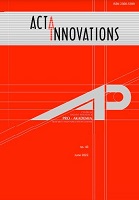INVESTIGATING THE EFFECT OF INSOLUBLE ADDITIVES TYPE ON THE DRAG REDUCTION PERFORMANCE IN A CRUDE OIL TURBULENT FLOW SYSTEM
INVESTIGATING THE EFFECT OF INSOLUBLE ADDITIVES TYPE ON THE DRAG REDUCTION PERFORMANCE IN A CRUDE OIL TURBULENT FLOW SYSTEM
Author(s): Wafaa Kamil Mahmood, Hayder A. Abdulbari, Asaad H. LaftSubject(s): Energy and Environmental Studies
Published by: Centrum Badań i Innowacji Pro-Akademia
Keywords: drag reduction; turbulence; insoluble additives; crude oil; powders;
Summary/Abstract: In the present work, the effect of three insoluble additives densities on reducing the drag of crude oil was investigated. The objective of the present work is to evaluate the effect of the insoluble additive’s densities on their drag reduction efficiency in hydrocarbon flow medium. Three powders with different densities are chosen, namely carbon powder, glass powder, and copper powder, with a density of 1710 kg/m3 , 2550 kg/m3 , and 8950 kg/m3 , respectively. The turbulence flow environment was created in a custom-made rotating disc apparatus with a maximum rotation speed of 300 rpm. To evaluate the effect of the powder density, the particle's size was chosen to be 100 µm. All the solutions were tested at the exact operating conditions with a rotation speed ranging between 200 to 2200 rpm. The experimental results showed a clear effect of the powder density on the drag reduction performance. The glass powders showed the highest drag reduction effect, while the copper and carbon powders were lower. The effect of the degree of turbulence on the drag reduction performance of the powders was clear, where the interaction between the powders and the turbulence structures (eddies) governed the turbulence-suppression efficiency of the additives.
Journal: Acta Innovations
- Issue Year: 2022
- Issue No: 43
- Page Range: 44-53
- Page Count: 10
- Language: English

